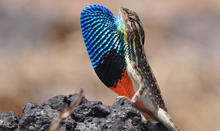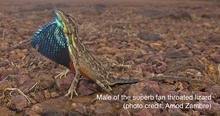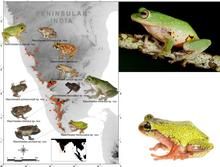Evolution
New genetic study provides fresh insights into the origin and evolution of the blackbuck
Wed, 2019-08-21 09:35Another ancient frog from the Western Ghats
Fri, 2019-03-15 11:51Fan-throated lizards of India are a highly diverse group with at least 15 species, possibly caused by climatic shifts around 8–5 million years ago.
Wed, 2017-12-27 16:30Image credit: Deepak Veerappan
Deepak. V (a postdoc) and Praveen Karanth show that fan-throated lizards consist of at least 15 species, with much of the diversification dating back to 8–5 million years and possibly caused by climatic shifts in India in that period. This is one of the few studies that establishes a link between climate change and adaptation in the Indian subcontinent. The study also highlights the importance of the dry zone as centers of biodiversity.
CES research team of Maria Thaker and Amod Zambre reveal functions of colourful throat displays of lizards
Mon, 2017-06-05 12:27Its raining bush frogs in the Western Ghats by Kartik Shanker and SP Vijayakumar
Thu, 2015-01-08 14:13Its raining bush frogs in the Western Ghats
Kartik Shanker and SP Vijayakumar
Should you find yourself wandering in the cloud-drenched mountains of the Western Ghats, you would be engulfed by a cacophony of frog calls. Many of these will be bush frogs, a group of miniature frogs distributed throughout south and southeast Asia. Some are so small that they can be accommodated on your thumbnail!
CES research shows that Hanuman langurs are a species complex
Wed, 2015-01-07 10:13Research work of Manjari Jain and Rohini Balakrishnan featured in Indiabioscience
Fri, 2014-04-11 10:21A recently published research work of Manjari Jain, a former PhD student of Prof. Rohini Balakrishnan and now a faculty at IISER Mohali, has been covered in Indiabioscience. A quote from the article:
Male crickets court their females through song. But in the wild, several species of crickets call together in a cacophonic chorus. Researchers from the Indian Institute of Science used a series of experiments that combined rigorous fieldwork and elaborate modeling to find out how the male’s song reaches its mate through the apparent din.
The research work of Joyshree Chanam, a PhD student working with Prof. Renee M Borges, has been covered by the New Scientist magazine.
Mon, 2014-02-24 09:44The research work of Joyshree Chanam, a PhD student working with Prof. Renee M Borges, on ant-plant interactions has been covered by the New Scientist magazine.
"A tusk-less future for the Asian elephant": Nature India writes about the research work of PhD student Karpagam Challaih
Thu, 2013-10-24 23:03Sandhya Sekar writes in Nature India blog about a recent research work of PhD student Karpagam Challaiah.
Karpagam Challaiah is working with Prof. Raman Sukumar on the ecology and evolution of asian elephants. The above article in Nature India blog, titled " A tusk-less future for the Asian elephant " is about Karpagam's recently published paper in Animal Behavior.
Congratulations, Karpagam!







